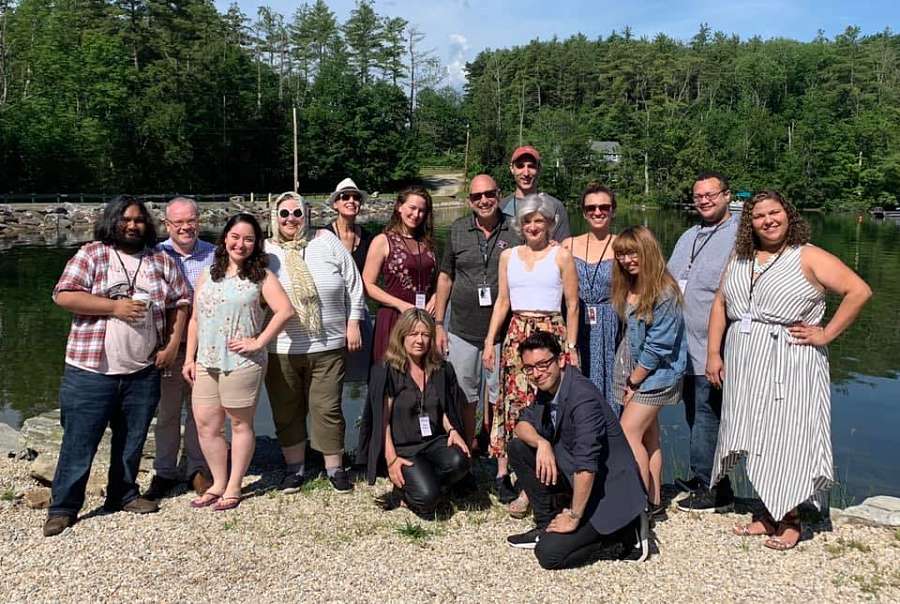Crickets.
This Miami native had never heard crickets. I imagined they were dreamy, filling the night with the beautiful sounds of nature. No: The nightmare began with the incessant chirping in my room for three days straight, day and night. I wasn’t getting any sleep since I was already up late writing. So I quickly grew to hate crickets.
Indeed, during my time at the O’Neill Theater Center for its annual National Critics Institute this past summer, I said more than once or twice (or 10 times), I never want to see another bug again. This may seem like a city girl’s horror story. But apart from the crickets, as I write about my two weeks at the National Critics Institute, it is really more like a love story.
I went in with such apprehension. The NCI is one of the oldest programs at the O’Neill and the nation’s only program designed for arts writers and critics to hone their skills. The journalist I met from last year’s TCG’s Rising Leaders of Color cohort who had experienced NCI warned me: It would be the best experience, but it would be an extremely challenging one. I knew how life-changing my two weeks at the O’Neill would be, and the prospect of changing your life is both exciting and scary. I still remember tossing and turning in bed the weeks before finally getting on the plane to Connecticut.
It turns out that NCI was everything I needed as a writer.
In fact, it was the single most important experience in my life so far as a writer. If I had to identify a throughline in my time there, it was about finding my voice. Actually, if I’m honest with myself, it was about trusting my voice. I had a voice when I went there, but I went there doubting it, and doubting myself. I vividly recall my heart racing every time we read our pieces aloud.
After every show at the O’Neill, Goodspeed Opera House, and the Williamstown Theatre Festival, we feverishly wrote reviews well into the night and finished them just in time for our 9 a.m. deadline. Then would gather outside on picnic benches under the beech tree by the water to analyze our articles. With each piece, every word, sentence, and paragraph was carefully considered until every review was a work of art in itself. Each criticism exercise pushed my writing to places I hadn’t been before. It was intense. I found that I was obsessing over every word.
It was a challenge to trust my voice when 12 other critics were picking apart mine and each other’s writing every day for two weeks. It was hard not to second-guess every sentence I wrote. Some nights it was hard just to get the first sentence down.
Everyone in the program was brilliant. The writers were from all over the U.S. (with two from Australia), each one with their own style and perspective. It was easy to feel like the “weakest link.” The part of the day when we reviewed everyone’s work and read it out loud for feedback was terrifying. Worse still was when your take on the play in question was completely different from the majority in the group.
But with every assignment, I dug my heels into my writing and worked on making my voice heard. I will forever keep in my memory bank the day the group erupted into applause upon reading one of my articles. It came after a particularly tough day. I remember thinking: Okay, you can do this. I began to trust myself.
A parade of wildly talented writers shared a common thread in their lessons: the writer’s voice. We had lectures that emphasized how important your voice is, and how voice can become more important than the framework of a piece. It was thrilling to work with all the critics in the program: Mark Blankenship, Sarah Kaufman, Michael Phillips, Sam Sifton, and Ben Brantley. Each shared a wealth of knowledge they gained through experience.
I filled a notebook with wisdom so graciously shared, taking note of every tidbit. Scribbled in my notes among the advice from our mentors was knowledge I gained from our sessions with actors, directors, playwrights. Each part of our day was loaded with a new experience. I went into the program as a theatre critic and came out with knowledge for writing about film, radio, food, music, TV, and dance.
I am most grateful, of course, for the mentorship of Chris Jones, who leads the program. Jones is the chief theatre critic and a Sunday cultural columnist at the Chicago Tribune. He is tough, and there is no doubt about it. Chris challenged all of us. Though he quickly grew into a father figure, as his tough love for our writing manifested itself in genuine care for our growth. I appreciated every kind word and every thoughtful critique. It was an honor to have a chance to work with him.
Though I don’t miss the crickets, I already miss my time at the O’Neill. I am forever grateful. I can honestly say I found my voice at the O’Neill this summer.
Cristina Pla-Guzman, a writer and educator based in Miami, is among this year’s TCG Rising Leaders of Color.


